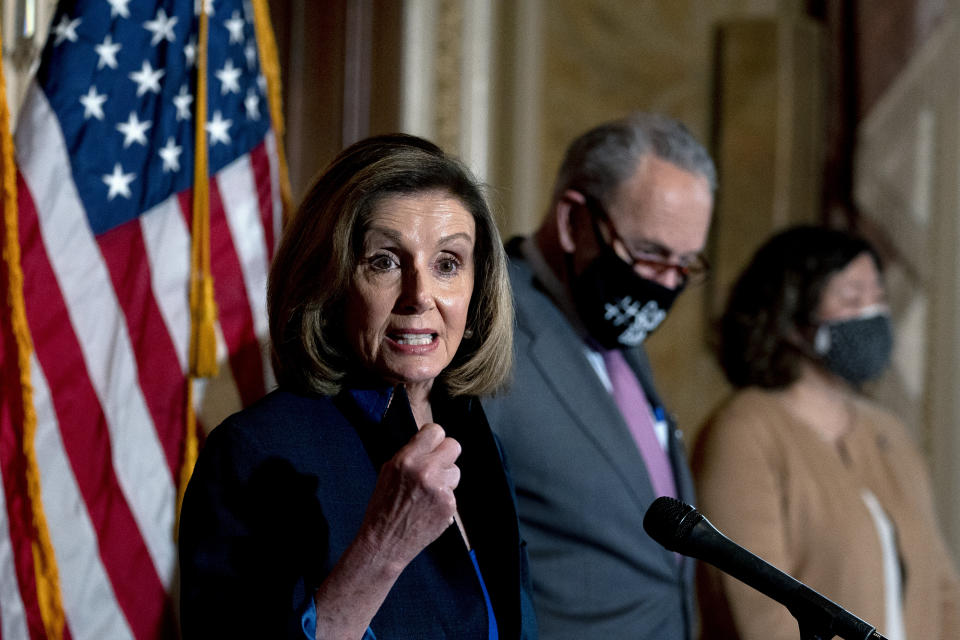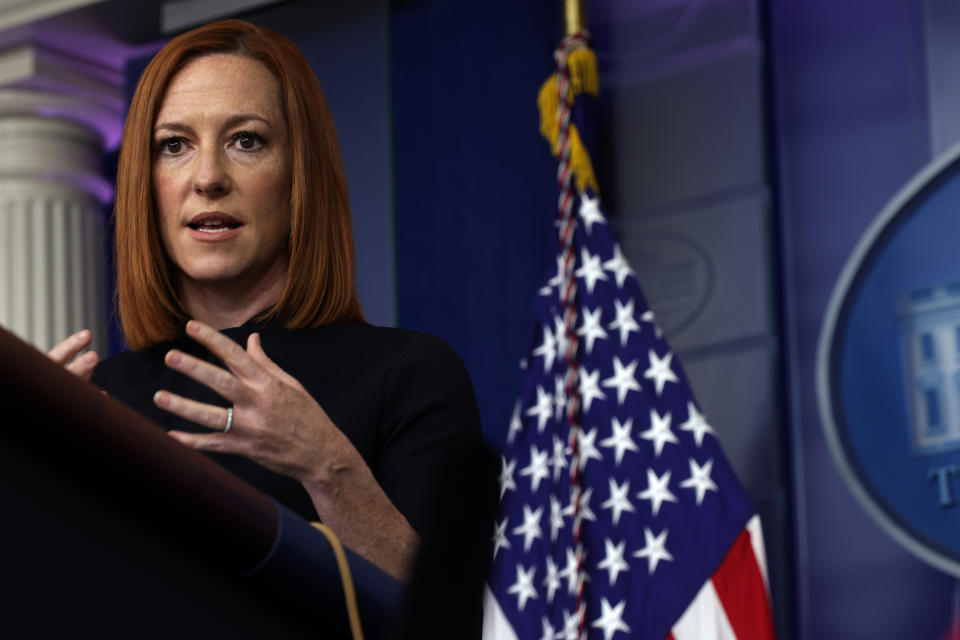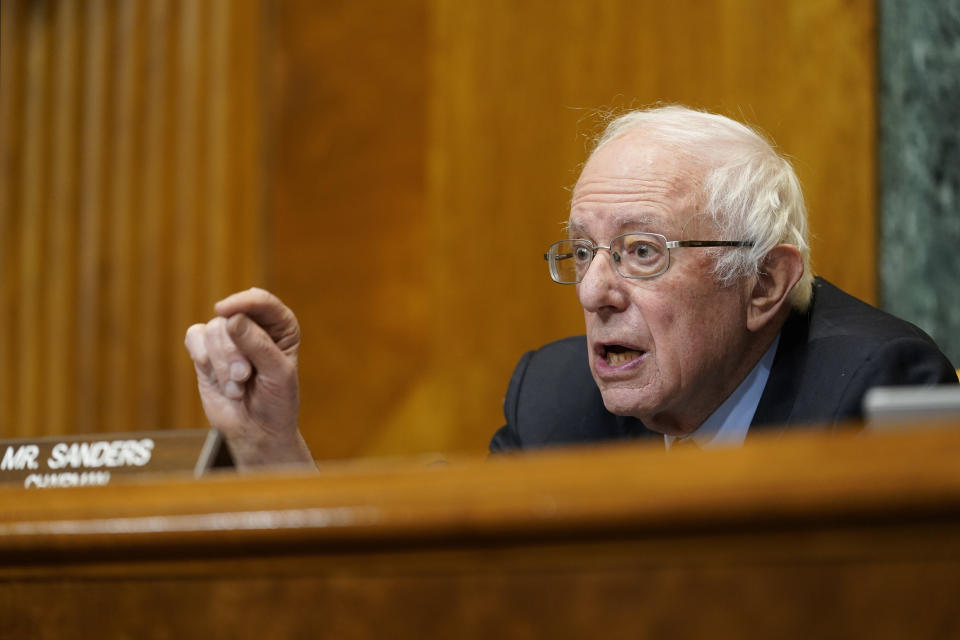Here's Why So Many Democrats Sound So Anxious About Biden's Health Care Agenda
- Oops!Something went wrong.Please try again later.
Some anxious Democrats and their allies sent President Joe Biden a clear message this week: Don’t forget about health care.
The impetus for the message was concern about Biden’s address to a joint session of Congress this coming Wednesday, when he will formally introduce the “American Family Plan.” The proposal is supposed to represent the second half of Biden’s economic agenda, and until recently, the assumption was that health care would figure prominently in it.
The only question was which policies, exactly, Biden would endorse. That prompted a familiar-sounding debate over what to prioritize, with progressives promoting improvements to and expansions of Medicare and House leaders, along with other establishment Democrats, pushing reinforcements of the Affordable Care Act.
That debate is still taking place. But this past week, another issue emerged. Rumors and then media reports suggested that the American Family Plan might not even have a major health care component.
That alarmed both camps, each of which interpreted the news as a sign of ambivalence from the president, and prompted a flurry of action very clearly designed to get the administration’s attention.
Some of these actions were right out in the open. When House Democratic leaders on Thursday reintroduced their prescription drug legislation, Speaker Nancy Pelosi (D-Calif.) went out of her way to say that it “will be a top priority for House Democrats to be included in the American Families Plan.”
Later that day, two groups of House Democrats sent letters to the White House, urging Biden to include health care in the American Family Plan.

One letter, written by Rep. Lauren Underwood (D-Ill.) and signed by 29 colleagues, mentioned specifically the importance of acting “at the first legislative opportunity.” That would likely mean including health care in a sprawling, all-purpose piece of legislation Democrats will have to pass on their own, through the budget “reconciliation” process in which Republicans can’t block bills with the filibuster.
Other signals were sent through private channels, among them a virtual meeting on Friday that leaders of progressive organizations requested with White House officials. At the meeting, they formally presented a letter signed by 45 groups and unions calling on the administration to include their health care priorities in the American Family Plan.
“We delivered that letter directly to the White House at a meeting on Friday,” Alex Lawson, executive director of Social Security Works, told HuffPost. “I also know our effort is not the only effort. There are letters coming from the House and the Senate, as well as letters from other organizations and unions, demanding we do health care in the next reconciliation package.”
The White House Says There’s No Reason To Worry
Whether these messages are making a difference, or whether they are even necessary in the first place, is hard to say.
Administration officials have said repeatedly, publicly and privately, that health care is a top priority for the president. As proof, they have pointed to his 2020 campaign agenda, which included an array of ambitious health care proposals ― among them, lowering the Medicare eligibility age, as progressives have been pushing to do for years.
Administration officials have also cited Biden’s role in crafting and promoting the COVID-19 relief package, the one that Democrats passed and that he signed in March. A key provision of that package temporarily increases the financial assistance available to people buying insurance on their own through HealthCare.gov along with Connect for Health Colorado, New York State of Health and other state-run exchanges.
These reforms, which translate into thousands of dollars in savings for some insurance buyers, are precisely the Affordable Care Act improvements that House leaders and their allies now want to make permanent.
Administration officials have also cautioned that deliberations over what to include in the American Family Plan and Wednesday’s speech are still taking place. “The president is still making final decisions, as is his prerogative, over the coming days about what will be included in the speech,” White House press secretary Jen Psaki said Friday.

As proof of how much is in flux, a report from The Washington Post’s Jeff Stein on Saturday said that the administration had tentatively decided the American Family Plan will include extension of the Affordable Care Act improvements, but not other health care features ― again, with the caveat that no final decisions had been made.
One last cautionary note from administration officials is about the actual significance of the speech and the plan, and whether Democrats would be right to interpret exclusion of certain health care provisions as a sign the president will not push for them.
“The American Families Plan and the speech on Wednesday will not represent the totality of every priority item for him and every item on his agenda that he wants to move forward as president,” Psaki said Friday.
A Crowded Agenda Will Force Some Tough Choices
That may all be true. At the same time, a president’s time is limited. So are votes in Congress and the money available to pay for new programs. Given the long list of initiatives that Democrats hope to enact, few and maybe none are going to get as much focus and funding as their fiercest champions would prefer.
A case in point is child care. Biden officials have signaled that they want to devote up to $425 billion in new expenditures over 10 years on early-childhood programs ― far more than the U.S. has ever spent, but still less than what it would take to create the kind of comprehensive, universal child care systems that exist abroad.
That is why the party figures and allies most focused on health care are speaking out now. It’s also why they are arguing with each other over precisely which health care policies to pursue, even though their visions overlap considerably.
After all, it is not as if progressives like Sen. Bernie Sanders (I-Vt.) and Rep. Pramila Jayapal (D-Wash.) object to making those Affordable Care Act improvements permanent. They recognize that the new subsidies reduce premiums and out-of-pocket costs for people who struggle with them.

But they are dedicated to pursuing their long-term goal of creating a “Medicare for All” system, with a single government program covering everybody. They believe that improving the Medicare benefit package and allowing more people to enroll would represent the most direct steps along that path, and it’s where those progressive groups that met with the White House on Friday would like to see policy go as well.
By the same token, Pelosi and her allies have already endorsed adding dental, visual and hearing benefits to Medicare, because they know the lack of those benefits causes real hardship for many seniors. They don’t have a problem with, and in many cases endorse, allowing more people to join Medicare.
But they also think reducing the Medicare eligibility age is a difficult lift politically. The idea has policy complications, especially related to its potential effects on employer coverage. It also provokes opposition from powerful health industry groups that see expansions of Medicare, with its lower payment rates, as threats to revenue.
A Final Compromise Is Possible To Imagine
The two sides are closer when it comes to drug policy, in part because Pelosi and House progressives already hashed out a deal that the House as a whole passed in 2019 and has left both ideological camps feeling good about it.
H.R. 3, the Elijah E. Cummings Lower Drug Costs Now Act, would give the federal government more power to reduce drug prices. That could not only ease the financial burden that prescriptions place on individual Americans. It could also reduce government spending on drugs through Medicare and Medicaid, freeing up money that could then help finance other priorities on health care.
It’s actually not that hard to imagine a common vision coming together, where Democrats in Congress agree on new prescription drug legislation that looks like H.R. 3, then agree to plow those savings into a set of health care policies that include some, most or maybe even all of what each camp wants.
But that would likely depend, in part, on getting drug pricing reforms as ambitious as those in H.R. 3 back through the House, where the Democratic majority is smaller than it was last time. The same reforms would also have to pass the Senate, where Democrats don’t have a single vote to spare and the pharmaceutical lobby holds a great deal of sway, especially over senators in states like Delaware and New Jersey, where drug manufacturers have a large presence.
Still, the Democratic pricing reforms have always been popular, and it looks like they are still popular now. At the meeting, Lawson told HuffPost, the progressive groups shared results from a recent Data for Progress survey showing overwhelming support for Democratic drug plans, even amid all the favorable publicity that the pharmaceutical industry has gotten for its role in developing COVID-19 vaccines.
Of course, the proposed enhancements to Medicare are popular too, as is making the Affordable Care Act improvements permanent.
The reality is that most of the Democratic agenda is popular these days, not just on health care. And while leaders will eventually have to choose which parts to emphasize, in some cases doing more may actually be easier than doing less.
This article originally appeared on HuffPost and has been updated.


